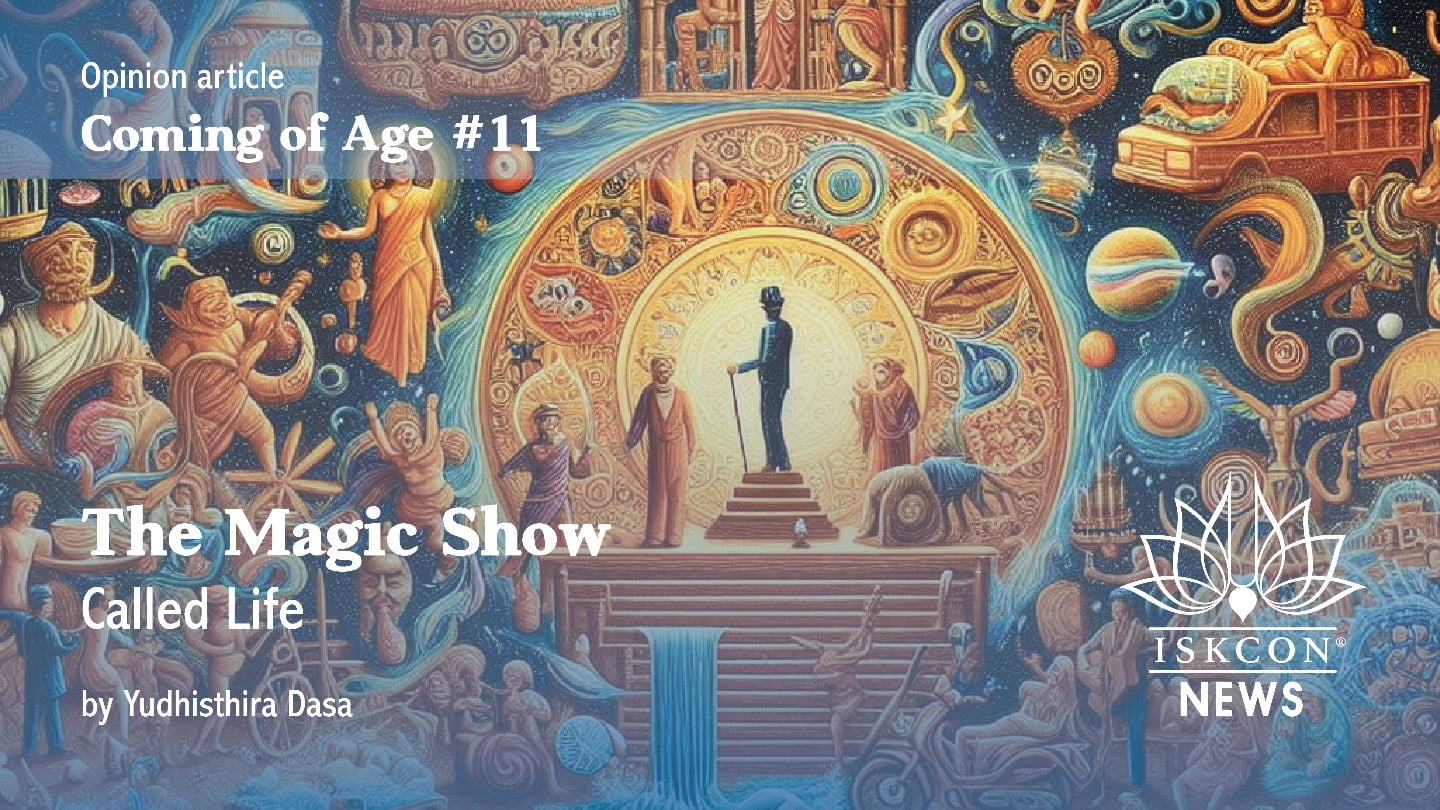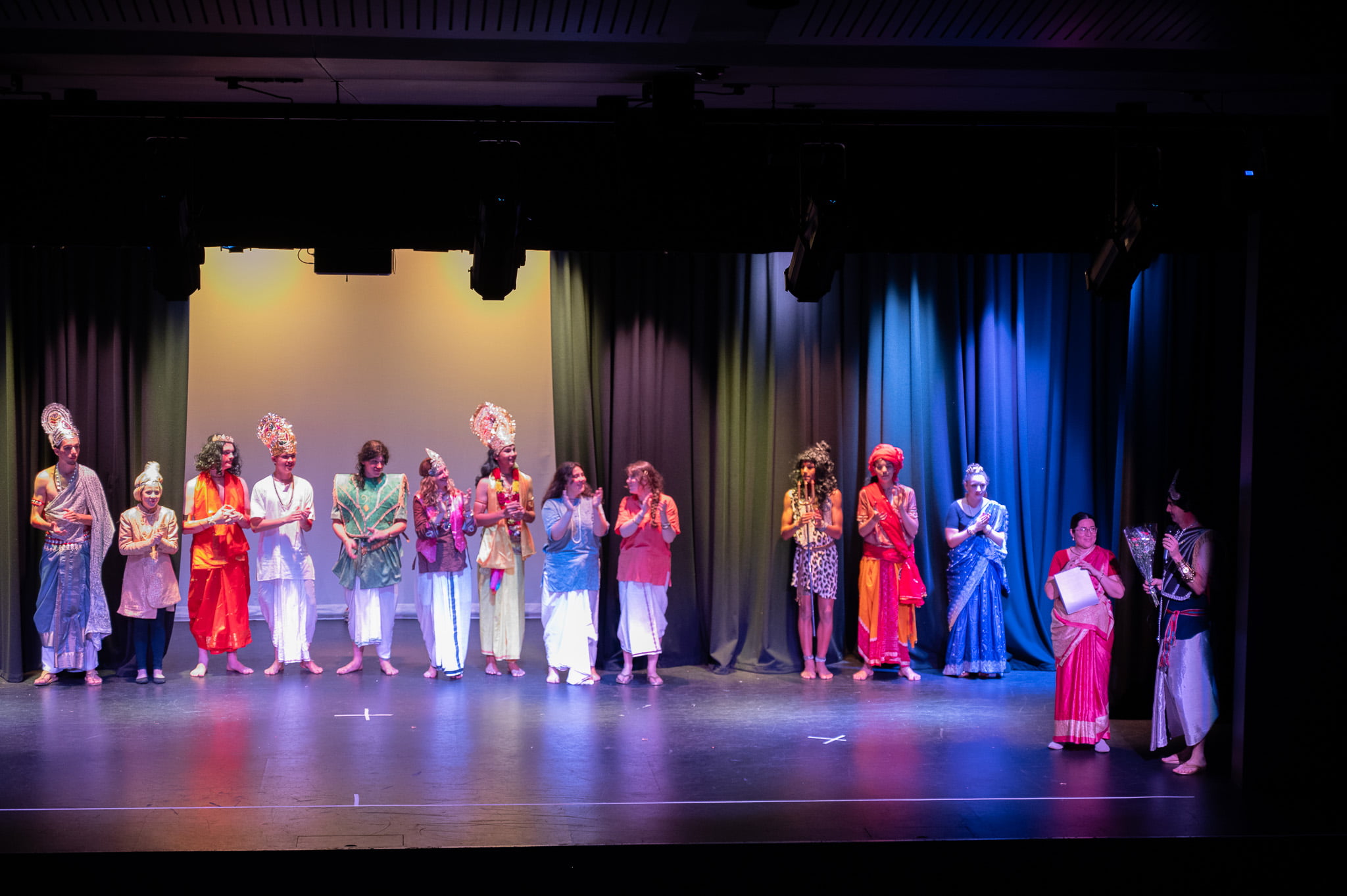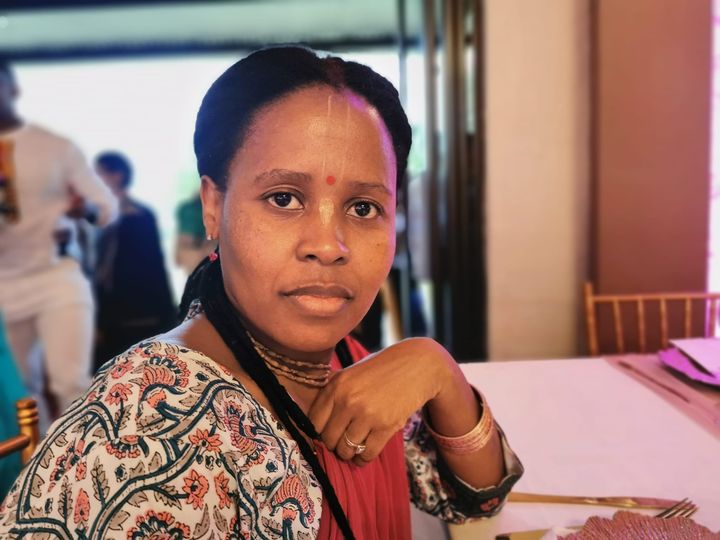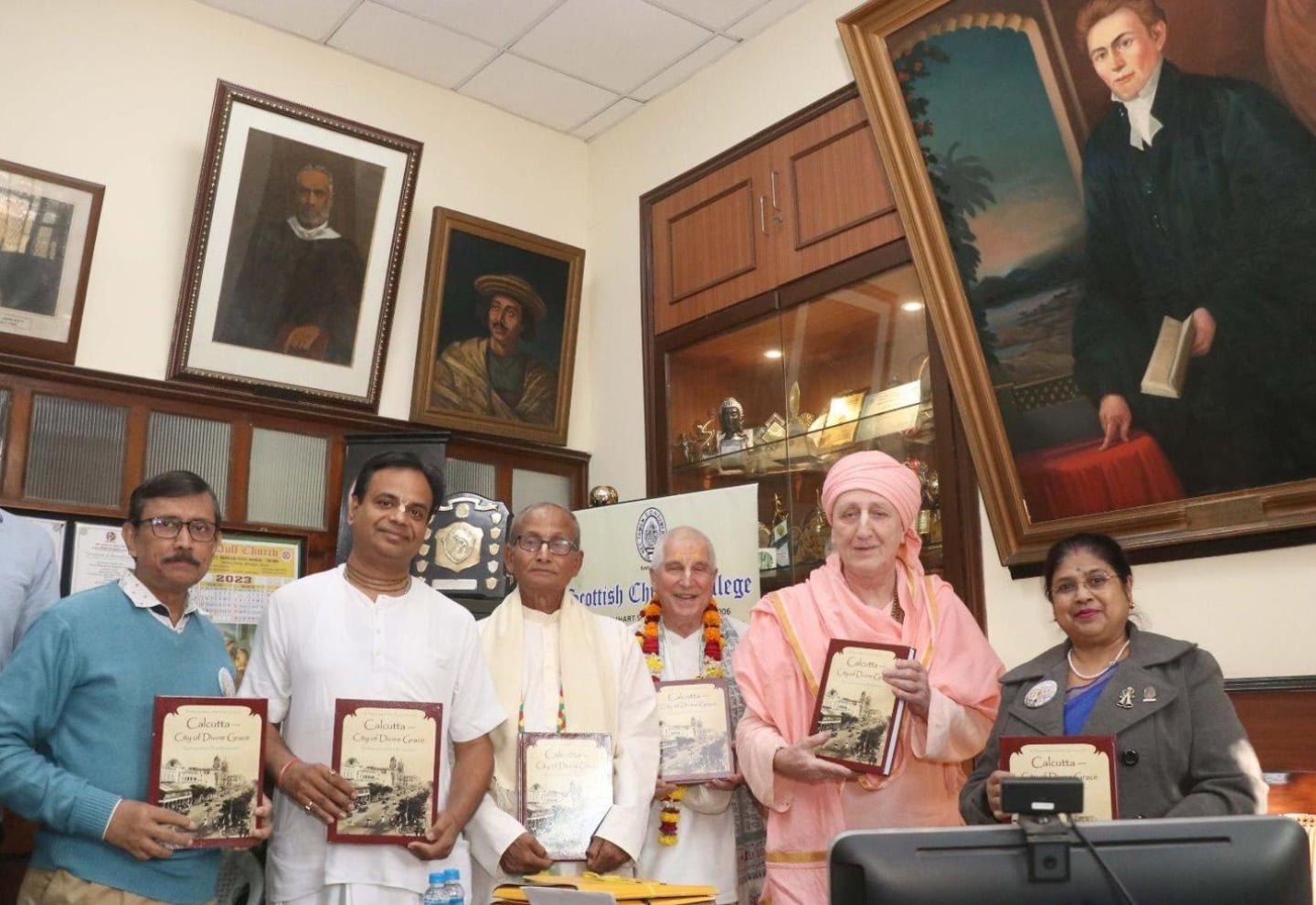Devotee Profile: Youth Leader and Magician Dattatreya Yogesvara Das
By Madhava Smullen | Jun 13, 2020

What leads one to become a Hare Krishna youth leader, initiated brahmana, real estate and food company manager, GBC trainee, and yes, a magician, all before the age of thirty-five?
For Dattatreya Yogesvara Das, it began with family. His mother Shaktimata Dasi, who joined ISKCON in 1973, worked for the BBT in the early days; his father Bhutabhavana Das, a Prabhupada disciple, was one of the pioneers who first brought Krishna consciousness to Africa.
What’s more, as the eldest of four – his brothers are Devananda, Dhanvantari and Dhananjaya – Dattatreya felt the responsibility to set a good example for his younger siblings. “That kept me out of trouble!” he laughs.
Spending his early childhood in Detroit, where his father is from, Dattatreya went to public school until second grade. When he first moved to the ISKCON New Raman Reti community in Alachua, Florida – where he’s lived ever since – in 1993 at the age of eight, he recalls that he thought devotees were weird.

Dattatreya (far left) with friends in Mayapur courtyard, 2009
“But I made friends with them, and became a weird kid too!” he says.
After spending third and fourth grades at the school now known as Bhaktivedanta Academy, Dattatreya spent a year in homeschool and then moved to Ritadhvaja Swami’s ashram, dubbed “The Vaishnava Academy for Boys,” at eleven. Although he spent the night at home with his parents, days at the ashram began at 4:30am with mangala arati, japa, guru puja, and Bhagavatam class, followed by academics and then cleaning, sports and hangout time, returning home only for dinner.
“It created a brotherhood,” Dattatreya says. “No matter what we were doing, we were having fun together. Even if we were washing pots, we were bonding in that situation. We created deep friendships that are lasting for life.”
Changing Lives on the Summer Trip
In 1998, at age twelve, Dattatreya went on his first Boys’ Summer Trip, another experience that would change his life. The annual Trip, which began in the early 1990s, saw Ritadhvaja Swami taking the boys from his school on a van tour of North America, visiting temples, helping set up Rathayatras, and going to fun nature spots. Getting the chance to see the continent and the extent of ISKCON on four different tours – in 1998, ’99, 2002 and ’03 – expanded Dattatreya’s worldview and gave him further bonding with his peers.
In 2005, when Ritadhvaja Swami suddenly announced that he had to cancel the trip due to health issues just three weeks before it was to start, Dattatreya, then only 19, and his friends Krishna Kishor Das, 18, and Krishna Priya, 20, volunteered to step in as organizers and youth chaperones. They’ve been organizing the tour ever since.

Dattatreya (front, center) in Hollywood with Summer Trip youth
Last summer, Dattatreya and his friends led the Summer Trip for its fifteenth consecutive year, with thirty-eight boys aged 10 to 17 from Italy, Colombia, Canada and all around the U.S. participating. Throughout the month-long trip, the boys helped set up Rathayatra festivals, put on cultural performances, visited temples, learned about ISKCON’s history, attended seminars and sanga discussions, did kirtan, and had fun sightseeing, camping and riding roller coasters.
Over the years, Dattatreya has seen the trip have a huge impact on many youth’s lives. “Growing up in Alachua, there were lots of devotee kids around, and we could be different together,” he explains. “But nowadays a lot of the kids that come on the trip might be the only devotee in their school or grade. The Summer Trip introduces them to other youth who know what they’re going through, and they feel more accepted. They feel like they have people who have their backs.”
Often this leads to lasting friendships, with youth regularly traveling long distances on their own time to meet up with friends they made on the Summer Trip. In addition, most of the young men who participate in multiple trips stay connected to Krishna consciousness. Some have said “I wouldn’t be a devotee” without it; others stay in touch with Dattatreya and his co-chaperones and open up about struggles or doubts they have.
Another tour – the ISKCON Youth Ministry bus tour run by Manorama and Jaya Sri Radhe for older youth – introduced Dattatreya to his wife, Radharani Dasi; and the couple now chaperone the Boys’ Summer Trip together.
“We got married in 2014, and a week later, we were on the Summer Trip – it was our honeymoon!” laughs Dattatreya. “We’ve been on six Summer Trips together, so I tell her, ‘I’ve taken you on six honeymoons.”

Dattatreya and his wife Radha at Niagara Falls in 2016
The Servant of the Master of All Mystics
Along with his ability to lead and his desire to inspire youth, Dattatreya is also known for being charismatic, enigmatic, and having a love of psychology and entertaining others.
These are some of the qualities that, at six years old, drew him to immediately ask for magic books after seeing his first magic show, and begin learning what he could from them. Later, as the age of the Internet dawned, he taught himself by watching magic videos. At about twenty years old, he joined a magic club at the University of Florida, and started to put on shows for fraternities, student clubs, and conventions.
Dattatreya is a magician with a difference – instead of using typical magic words like “hocus pocus” or “alakazam,” he has his audiences say “Radha Govinda,” thus engaging them in chanting the Holy Name. He also uses “Dattatreya Yogesvara” as his stage name.
“The Narayana Kavacha prayer in the the sixth canto of Srimad-Bhagavatam invokes ‘Dattatreya, the master of all mystic powers,” he says. “And of course, Yogesvara is the master of all mystics. So I tell people that my name is Dattatreya Yogesvara Das, which means the servant of the master of all magic tricks and all magicians.”
Although Dattatreya specializes in close-up magic such as card tricks, he also developed stage illusions to perform at Rathayatra festivals and Vaishnava holidays around North America, as well as Mayapuris kirtan performances at yoga studios. Some of his most famous staples include the rope trick, the torn and restored newspaper trick, and the infinite money trick. He has also incorporated Krishna conscious philosophy and Deities into his magic. In one trick, he explains that Krishna is the Lord of the Universe, and that He creates everything, while pulling different colored silks out of thin air. In the grand finale, amid an explosion of silks, a giant Jagannath flag appears.
“Devotees love it,” he grins.

Dattatreya and his wife Radha (center, back) with Summer Trip youth at Lake Louise in Banff National Park, Canada in 2014
The Mystic Power of Krishna Conscious Practice
Dattatreya Yogesvara’s name, so perfect for his chosen art, is no coincidence as far as he’s concerned.
Having loved magic since he was a child, he had always been partial to the name Yogesvara, meaning master of all mystics, and wished it was his name instead of his given name, Dattatreya. But he had never shared this with anyone. Then he came across the passage in the Srimad-Bhagavatam that describes “Dattatreya, the master of all mystic powers.” Amazed that Dattatreya had been a magician too all along, he felt better.
Finally on Gaura Purnima 2011, when he received first initiation from His Holiness Jayapataka Swami, and was given the name “Dattatreya Yogesvara,” Lord Krishna’s hand in the matter was clear.
“When people say they don’t believe in God, I feel like they just haven’t had those kinds of experiences,” he says.
Similar experiences with the Srimad-Bhagavatam and the Holy Name led Dattatreya to take first initiation, and then, in 2012, brahmana initiation. At first, he had no plans to do so. However, when he took a Kartik vow in 2009 to read ten pages of the Srimad-Bhagavatam a day, and saw how often Srila Prabhupada emphasized the importance of having a guru, he gradually began to change his mind. On top of that, he says, “Srimad-Bhagavatam made me a better person.”
While he enjoys kirtan, it’s reading Prabhupada’s books that brings Dattatreya the most happiness in Krishna consciousness. Early in his reading journey, when his father would tell him that everything was contained in Prabhupada’s books, he would think, “That’s just something Prabhupada disciples say.” But when he dived in, he often found that pieces of knowledge he particularly valued in secular books would turn up in Prabhupada’s books too. “That helped me appreciate Srila Prabhupada even more,” he says.

Dattatreya with his wife and brothers in Guatemala, building a school for underprivileged children (from left to right) Dhananjaya, Dattatreya, Radha, Devananda, Dhanvantari
Meanwhile, Dattatreya’s journey towards committing to chanting sixteen rounds of japa a day was also somewhat mystical.
“At first, I felt like I didn’t have time to chant sixteen rounds,” he says. “I had too many things going on – whether it was school, work, or my social life. But then I did a few experiments where I stopped chanting for a month or two, and I found that I wasn’t getting anything done. It seemed like I had less time, not more. Whereas when I chanted my sixteen rounds in the morning, I accomplished so much more, even though it felt like I was putting more on my plate. Why that is, I’m not sure.”
Future GBC
The focus that chanting brings to his life is important to Dattatreya, who is not only busy with so many services and hobbies, but also works full-time. After getting his Commercial Driver’s License to drive for the ISKCON Youth bus tour, he made his living as a bus driver for five years. Today, he works as a manager for both a real estate company and a health food company, whose products he is currently marketing to Wholefoods.
Dattatreya’s plan is to support himself and his wife Radha with this business while doing voluntary service for ISKCON.
Most recently, he has answered the call for succession in ISKCON, enrolling in the GBC college for Leadership Development at the request of senior devotees Ritadhvaja Swami, Bhaktimarga Swami, and Alachua temple president Mukhya Dasi, who all felt he would be well suited to the service.
The intensive training program began with a two-week residential at New Vrindaban, West Virginia in Fall 2019, with candidates learning Srila Prabhupada’s leadership principles; how to inspire trust; team building; collaboration; accountability; how to see the good in others, and more.

Dattatreya (back row, center) with students and teachers at the GBC College in New Vrindaban, November 2019
Currently, Dattatreya is is spending nearly a year continuing his training with online courses, learning about temple administration, fundraising, book distribution, community development, managing farm communities, and child protection. COVID-19 permitting, the seventeen-month program will end with another residential course and some real life project experience. Dattatreya would then be a candidate to become a Zonal Supervisor, assisting a local GBC member in a particular part of the world in managing ISKCON there.
Dattatreya feels that if given the opportunity, he could contribute a level head and balanced viewpoint to ISKCON, opening devotees of differing opinions up to discussion, and helping to create a less polarized atmosphere.
Ultimately, despite the dark times humanity is currently going through, he has faith in Srila Prabhupada’s assertion that there will be a 10,000-year golden age during which Lord Chaitanya’s movement will reach every town and village.
First, however, he says, “I do feel that as a movement we need to focus on helping the youth, taking care of the devotees, and propagating the Holy Name. Otherwise, the golden age will still happen, but maybe it won’t be ISKCON who does it.”
As far as the broader challenges the world is facing today, Dattatreya Yogesvara feels that there is hope if we utilize them to improve ourselves. “We are definitely having some problems, but they are going to present opportunities for us to figure out how to live our lives in a better way,” he says. “That’s what I believe.”
Overall, his outlook for the future is a positive one. “If we look at history, we see that it goes in circles – things get bad, and then they get better,” he says. “After winter, comes the spring. We’re going to be alright.”












